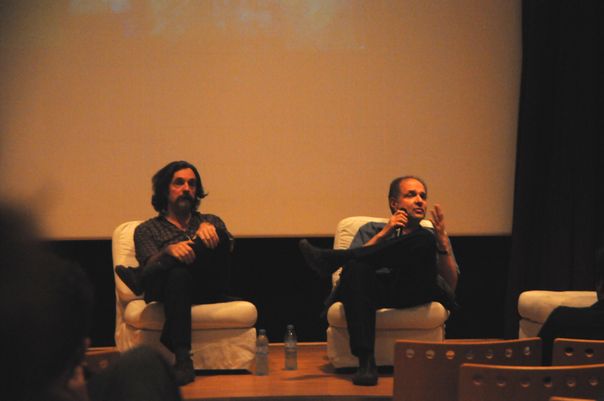What is cinema (today)?
Sebastián Santillán of the talent Press Buenos Aires 2011 sees new directions of film production and distribution discussed at the panel “New Forms: Beyond Cinema”.

Jorge La Ferla and Enrique Longinotti at the Talent Campus Buenos Aires 2011.
The presentation “New Forms: Beyond Cinema” was held as part of the sixth edition of the Talent Campus Buenos Aires, which also included the first local edition of a specialized seminar for Talent Press film critics and journalists. The discussion was led by Jorge La Ferla and Enrique Longinotti, two renowned and celebrated theorists and teachers, who brought up a basic ontological question: What is cinema?
This question is as old as the film industry itself. The top French film theorist of the twentieth century, André Bazin, placed it at the core of his queries. But the fact that the response has varied over time is a sign that not only the film industry has changed, but also the intellectual thinking around it. At a time when audiovisual means inundate our lives, the answer to the question of what cinema is seems to escape us.
One of the current trends being discussed is the displacement of film viewing from the traditional movie theatre to computers and mobile devices, and even places such as museums and art centres, which seek to replace traditional projection spaces with audiovisual facilities. Well-known individuals such as Jean-Luc Godard, Chris Marker, Chantal Akerman, Pedro Costa and Apichatpong Weerasethakul, among others, have contributed to this debate. Therefore, classical movie theatres can be considered as one more possible facility that has been conventionalized, but now is brought into question by postmodernism.
In addition, Danto’s theory about the end of art seems to nevertheless bring about a resurrection, which somehow vindicates the notion of film aesthetics: in today’s hyper-speed world, individual film viewing on computers bears a closer resemblance to Edison's kinetoscope than to the big screen of the Lumieres.
Does this shift away from movie theatres modify the film experience? Yes, it does. However, through mimesis we still feel part of the experience, since discourses remain intact despite the switch from one means to another and their intrinsic characteristics.
An evolving and yet young concept, the film industry constantly seeks redefinition, though always maintaining its inexpressible ability to capture the sublime.

